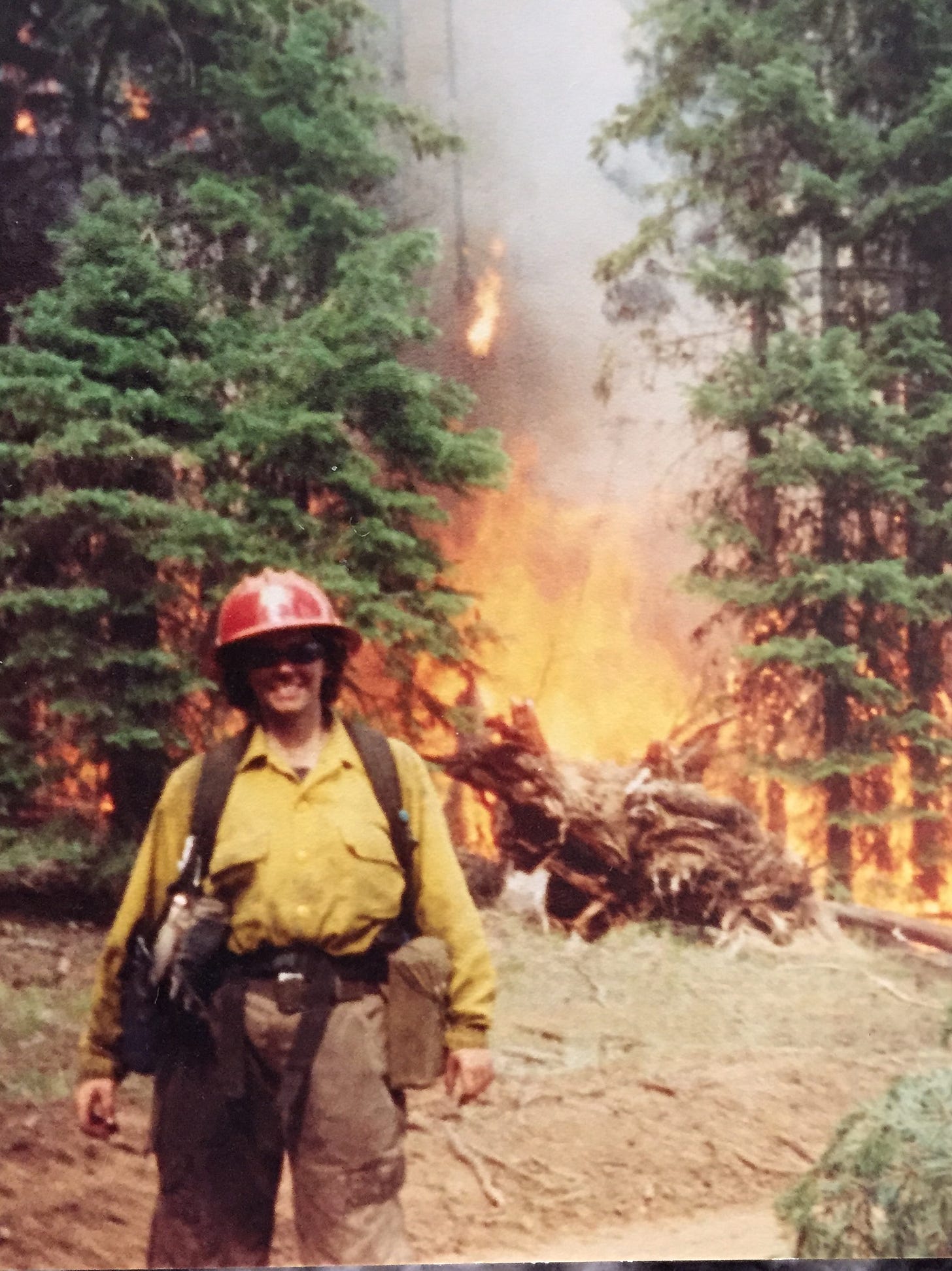We Are Nature
What I've learned in the process of writing my book
To all of my subscribers: thank you for hanging in there. I’m back! Huge thanks to my paying subscribers who haven’t left. I appreciate you so much.
For the past three weeks, I’ve worked twelve-hour days on my final revisions. If all goes well, HOTSHOT will be published next summer. This book has taken me five years to write. It’s been a grueling process. I want to share what I’ve learned.
When I decided to go back to school after leaving my last fire job in Alaska, I never thought I’d write about fire. I honestly didn’t want to think about it at all. My experiences as a hotshot and wildland firefighter were varied, but some of them were terrible, especially because I was, so often, tokenized as the only femme on my crew, or one of two.
But during my MFA, one of my mentors asked me: why don’t you write about firefighting? It never occurred to me that people would be interested in hearing about my experiences.
I also never thought I’d write a hybrid memoir— a book that isn’t only about me and my experiences, but about colonization, the history of fire suppression, Indigenous fire, and ecology, as well as climate change. I’m not a scientist or a historian. But I do know how to research, and I learned a lot about researching (and interviewing) throughout the process of writing the book.
What I learned while writing my book:
The idea of wilderness and the separation of nature from humanity are killing our planet.
When Europeans first arrived to the “New World,” they were incapable of understanding the land as anything but barren. What they called “wilderness” was wasteful and uncivilized. Their rigid ideas of agriculture overlooked what is now obvious: that the land they saw as untouched was in fact manipulated by Native Americans, who practiced sophisticated forms of agriculture while also supporting the landscapes in which they lived, rather than exploiting the land for commodities.
When conservationism began in the late 1800s, it was rooted in romanticist ideology— that nature was separate from humans; a sacred space in which they could find refuge. In essence, conservationism stole lands from Native Americans in order to “preserve” it for the enjoyment of the middle and upper classes. This land was not only commodified in terms of tourism but also for extractive capitalism. Fire suppression began in earnest, primarily to preserve timber (it’s had the opposite effect).
These ideals live on today. In most western cultures, including U.S. culture, nature is perceived as separate from us. We look at cities and cars and see them as unnatural, when they are in fact part of nature. When we are part of nature. When everything on this planet is nature itself, drawn from this earth. This separation allows us to avoid personal accountability in many ways, specifically in terms of how we impact the planet. We can even see this in the idea of city parks, state parks, national parks etc. To find ourselves in nature we must go somewhere. Nature is cordoned and frangmented rather than integrated into our every day lives.
This is a false dichotomy, and it’s killing us.
There’s no need to travel to national parks or preserves if we can understand that the nature within us and surrounding us is all sacred and deserving of care. Our backyards, the plants in our homes, our gardens— all of these are as much part of nature as everything else. Our cars and homes are powered by nature. Our bodies are powered by the foods from the earth, however modified.
This has been my biggest takeaway from my own writing process. It’s transformed the way I see the world, and the way I perceive preservation as a whole. Nature is not dying. We are dying.
When will we all realize this and take tangible action to slow the increasing damage of climate change? When will we dig our hands into the soils of our local communities and start there, instead of sending checks to protect lands far from us? (We can do both, I know).
In the next few months, I’ll be writing more about this, and sharing the texts I discovered while working on my book. I’ll also be engaging with more recent media and deconstructing these ideals. I’m really looking forward to posting regularly and building this community as I await the publication of my book.
While you’re here, tell me where you’re finding yourself in nature, wherever you are.




I used to feel separate from nature until I started to consume mushrooms regularly and experienced a paradigm shift that made me see how nature is everything including myself. The earth is a living thing that I am a part of.
Thanks for this writing. I totally agree with you, and grieve the slow destruction around me here in rural New Mexico. Since Covid (and better internet), there have been many people moving in from cities, building homes they spend a few weeks a year in, mowing their 'lawns', and irreparably changing the face of this area where we can still, sometimes, see large herds of elk, deer and the occasional mountain lion. I feel they are making this area into what they left, without a moment's consideration of where they are.